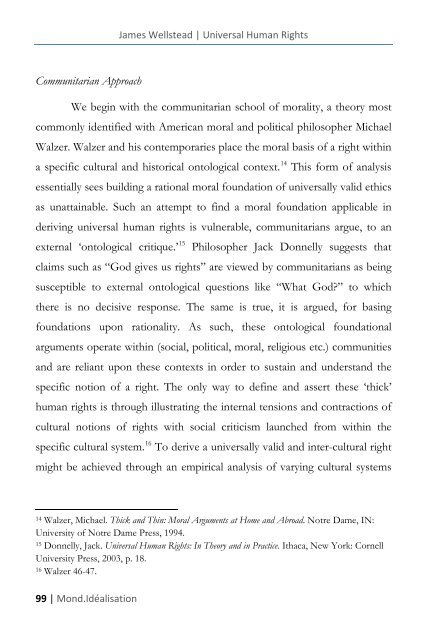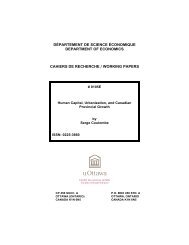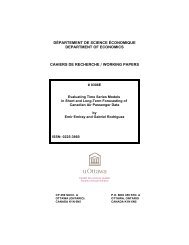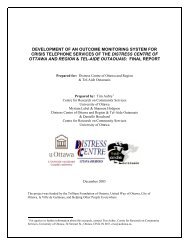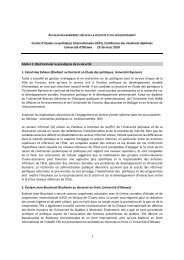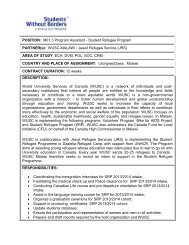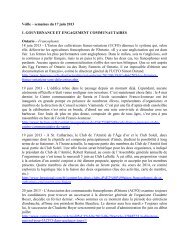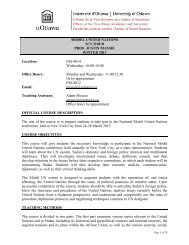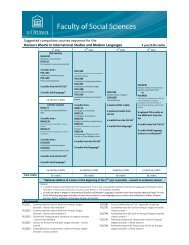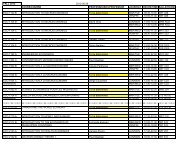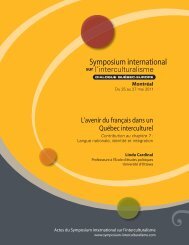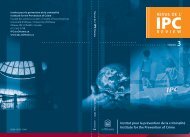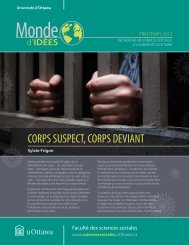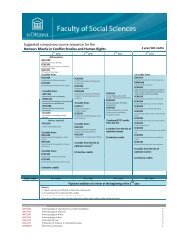GLOB.IDEALIZATION MOND.IDÉALISATION - Faculty of Social ...
GLOB.IDEALIZATION MOND.IDÉALISATION - Faculty of Social ...
GLOB.IDEALIZATION MOND.IDÉALISATION - Faculty of Social ...
You also want an ePaper? Increase the reach of your titles
YUMPU automatically turns print PDFs into web optimized ePapers that Google loves.
Communitarian Approach<br />
99 | Mond.Idéalisation<br />
James Wellstead | Universal Human Rights<br />
We begin with the communitarian school <strong>of</strong> morality, a theory most<br />
commonly identified with American moral and political philosopher Michael<br />
Walzer. Walzer and his contemporaries place the moral basis <strong>of</strong> a right within<br />
a specific cultural and historical ontological context. 14 This form <strong>of</strong> analysis<br />
essentially sees building a rational moral foundation <strong>of</strong> universally valid ethics<br />
as unattainable. Such an attempt to find a moral foundation applicable in<br />
deriving universal human rights is vulnerable, communitarians argue, to an<br />
external ‘ontological critique.’ 15 Philosopher Jack Donnelly suggests that<br />
claims such as “God gives us rights” are viewed by communitarians as being<br />
susceptible to external ontological questions like “What God?” to which<br />
there is no decisive response. The same is true, it is argued, for basing<br />
foundations upon rationality. As such, these ontological foundational<br />
arguments operate within (social, political, moral, religious etc.) communities<br />
and are reliant upon these contexts in order to sustain and understand the<br />
specific notion <strong>of</strong> a right. The only way to define and assert these ‘thick’<br />
human rights is through illustrating the internal tensions and contractions <strong>of</strong><br />
cultural notions <strong>of</strong> rights with social criticism launched from within the<br />
specific cultural system. 16<br />
To derive a universally valid and inter-cultural right<br />
might be achieved through an empirical analysis <strong>of</strong> varying cultural systems<br />
14 Walzer, Michael. Thick and Thin: Moral Arguments at Home and Abroad. Notre Dame, IN:<br />
University <strong>of</strong> Notre Dame Press, 1994.<br />
15 Donnelly, Jack. Universal Human Rights: In Theory and in Practice. Ithaca, New York: Cornell<br />
University Press, 2003, p. 18.<br />
16 Walzer 46-47.


